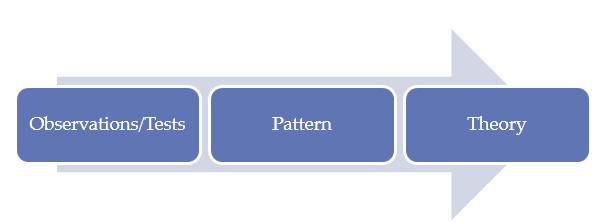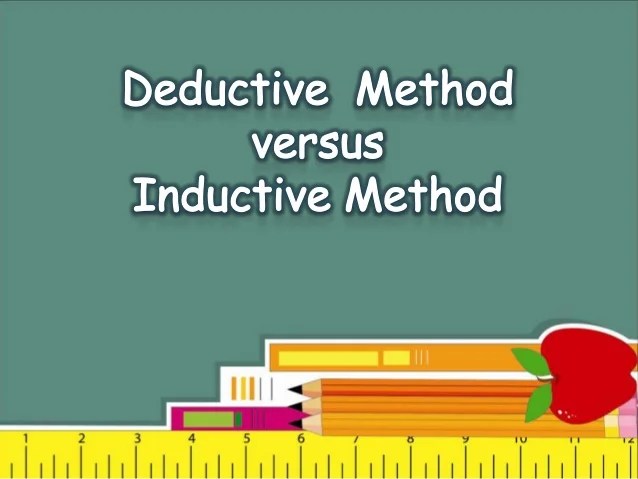Deductive reasoning, also deductive logic, is the process of reasoning from one or more statements (premises) to reach a logical conclusion.[1]. Deductive reasoning goes in the same direction as that of the conditionals, and links premises with conclusions. If all premises are true, the terms are clear, and...Deductive reasoning, or deductive logic, is a type of argument used in both academia and everyday life. Also known as deduction, the process involves This is alternatively referred to as "top-down" logic because it usually starts with a general statement and ends with a narrower, specific conclusion.Deductive reasoning is sometimes referred to as top-down logic. The Greek philosopher Aristotle, who is considered the father of deductive A common form of deductive reasoning is the syllogism, in which two statements — a major premise and a minor premise — reach a logical conclusion.Deductive reasoning is dependent on its premises. That is, a false premise can possibly lead to a false result, and inconclusive premises Once Newton induced that principle, he applied it deductively to make many predictions. Galileo applied it to deduce the existence of a planet disturbing's Uranus's...There are three basic ways of gaining information about the world: inductive reasoning, deductive reasoning, and abductive reasoning. Inductive reasoning starts by looking at information and trying to figure out the causes. Deductive reasoning takes starting assumptions and derives things from them.
What Is Deductive Reasoning? Learn the Definition of... - MasterClass
Deductive reasoning, also deductive logic, is the process of reasoning from one or more statements (premises) to reach a logical conclusion. Deductive reasoning goes in the same direction as that of the conditionals, and links premises with conclusions.Ratings 33% (3) 1 out of 3 people found this document helpful. This preview shows page 5 - 6 out of 6 pages. 42. Deductive reasoning is also referred to as Thinking or drawing conclusions based on past personal experience, emotions, or a gut feeling is referred to as: 45. Research has shown that...Deductive reasoning is also referred to as the "top down approach", where you start with a general idea and work your way down to a specific idea or a specific solution. As professor Nyaboke Christopher Marwa puts it, deductive argument is from universal to particular.Deductive reasoning is also referred to as top-down reasoning, because it starts at the "top" with the more general understandings, working "down" to specific conclusions.

What are the best examples of deductive reasoning? - Quora
Deductive reasoning is the kind of reasoning in which, roughly, the truth of the input propositions (the premises) logically guarantees the truth of the output If the three premises are true, the conclusion is guaranteed to be true. By contrast, a reasoner who infers from the belief (i) All swans that have been...Deductive reasoning is a basic form of valid reasoning. Deductive reasoning, or deduction, starts out with a general statement, or hypothesis, and examines Therefore, the conclusion is logical and true. In deductive reasoning, if something is true of a class of things in general, it is also true for all...Also referred to as top-down thinking, deductive reasoning is one type of valid reasoning; the other main type is inductive reasoning. Through deductive reasoning, one draws a specific conclusion from general logic and true premises.Deductive reasoning is also referred to as _____ reasoning. A. top-down B. theoretical C. concrete D. bottom-up. Thinking or drawing conclusions based on past personal experience, emotions, or a hunch is referred to as _____. A. deductive reasoning B. intuitive thought C. concrete reasoning D...Deductive reasoning is the process of drawing a conclusion based on premises that are generally assumed to be true. Also called deductive logic, this act uses a logical premise to reach a conclusion and is often referred to as top-down reasoning. If something is assumed to be true and another thing...
During the medical procedure, deductive reasoning is used to reach a logical true conclusion. Another form of reasoning, inductive, is also used. Often, other people confuse deductive reasoning with inductive reasoning, and vice versa. It is necessary to be told the which means of each type of reasoning in order that right kind good judgment can also be identified.
Deductive reasoning
Deductive reasoning is a fundamental form of legitimate reasoning. Deductive reasoning, or deduction, starts out with a common remark, or hypothesis, and examines the possibilities to succeed in a specific, logical conclusion, in accordance to California State University. The scientific method uses deduction to check hypotheses and theories. "In deductive inference, we hold a theory and based on it we make a prediction of its consequences. That is, we predict what the observations should be if the theory were correct. We go from the general — the theory — to the specific — the observations," mentioned Dr. Sylvia Wassertheil-Smoller, a researcher and professor emerita at Albert Einstein College of Medicine.
Deductive reasoning most often follows steps. First, there is a premise, then a 2d premise, and in the end an inference. A commonplace form of deductive reasoning is the syllogism, by which two statements — a big premise and a minor premise — achieve a logical conclusion. For instance, the idea "Every A is B" might be adopted through any other premise, "This C is A." Those statements would lead to the realization "This C is B." Syllogisms are regarded as a good way to check deductive reasoning to be sure the argument is legitimate.
For instance, "All men are mortal. Harold is a man. Therefore, Harold is mortal." For deductive reasoning to be sound, the speculation must be correct. It is assumed that the premises, "All men are mortal" and "Harold is a man" are true. Therefore, the conclusion is logical and true. In deductive reasoning, if one thing is true of a category of items normally, it is also true for all individuals of that magnificence.
According to California State University, deductive inference conclusions are certain provided the premises are true. It's possible to come to a logical conclusion although the generalization is now not true. If the generalization is unsuitable, the realization is also logical, however it should also be untrue. For instance, the argument, "All bald men are grandfathers. Harold is bald. Therefore, Harold is a grandfather," is legitimate logically but it is untrue since the unique statement is false.
Inductive reasoning
Inductive reasoning is the opposite of deductive reasoning. Inductive reasoning makes vast generalizations from explicit observations. Basically, there is knowledge, then conclusions are drawn from the information. This is called inductive logic, in accordance to Utah State University.
"In inductive inference, we go from the specific to the general. We make many observations, discern a pattern, make a generalization, and infer an explanation or a theory," Wassertheil-Smoller advised Live Science. "In science, there is a constant interplay between inductive inference (based on observations) and deductive inference (based on theory), until we get closer and closer to the 'truth,' which we can only approach but not ascertain with complete certainty."
An example of inductive common sense is, "The coin I pulled from the bag is a penny. That coin is a penny. A third coin from the bag is a penny. Therefore, all the coins in the bag are pennies."
Even if all of the premises are true in a remark, inductive reasoning allows for the realization to be false. Here's an example: "Harold is a grandfather. Harold is bald. Therefore, all grandfathers are bald." The conclusion does not observe logically from the statements.
Inductive reasoning has its position within the clinical means. Scientists use it to shape hypotheses and theories. Deductive reasoning permits them to follow the theories to explicit eventualities.
Abductive reasoning
Another form of clinical reasoning that does not fit in with inductive or deductive reasoning is abductive. Abductive reasoning most often begins with an incomplete set of observations and proceeds to the likeliest conceivable reason for the gang of observations, in accordance to Butte College. It is in accordance with making and testing hypotheses using the best knowledge to be had. It steadily includes making an educated guess after watching a phenomenon for which there is no transparent explanation.
For example, a person walks into their front room and finds torn up papers far and wide the floor. The individual's dog has been alone in the room all day. The particular person concludes that the canine tore up the papers as it is the most likely situation. Now, the individual's sister will have brought through his niece and she or he may have torn up the papers, or it is going to have been achieved by way of the landlord, but the dog principle is the much more likely conclusion.
Abductive reasoning is useful for forming hypotheses to be tested. Abductive reasoning is ceaselessly used by docs who make a diagnosis in keeping with check effects and by way of jurors who make choices in keeping with the proof introduced to them.
Additional sources
About of the variation in age of puberty is determined by ...

brm midterm (1).docx - Lecture 2 A theory is an abstract ...

Deductive reasoning is also referred to as Answer top down ...

pts An is a thought or image about a group of people based ...

Chapter 5. Creating effective business messages - Chapter ...

Deductive Reasoning: Definition and Examples | Indeed.com

Inductive Approach (Inductive Reasoning) - Research ...

About of the variation in age of puberty is determined by ...

978-1506351643 Test Bank Chapter 20 | Get 24/7 Homework ...

(Online Course) CSAT Paper - II : Logical Reasoning ...

Creativity through abductive reasoning | Solving for Pattern

Deductive and inductive method of teching

Logical reasoning-and-analytical-ability-syllogism

Deductive reasoning is also referred to as reasoning a top ...

PPT - 2.6 Algebraic Proof PowerPoint Presentation, free ...

What is Deductive Reasoning? (And Inductive vs Deductive ...

What is critical thinking

Chp 10 Test - Chapter 10 Question 1 The nurse is providing ...

Discuss how research can support or refute a biased ...

Reasoning that includes propositions and possibilities ...

What is the Inductive Method | Inductive Reasoning ...

0 Comment to "These Examples Of Deductive Reasoning Will Help... - Science Struck"
Post a Comment